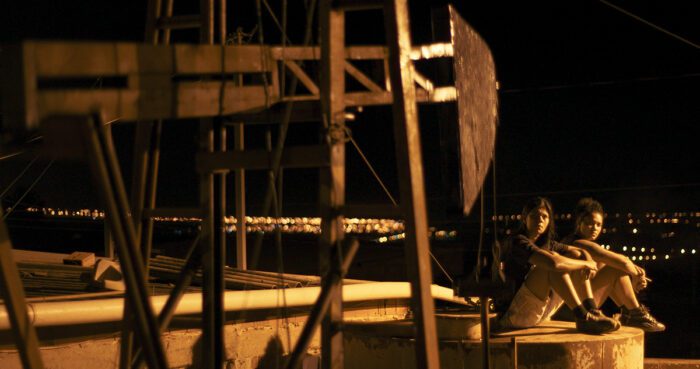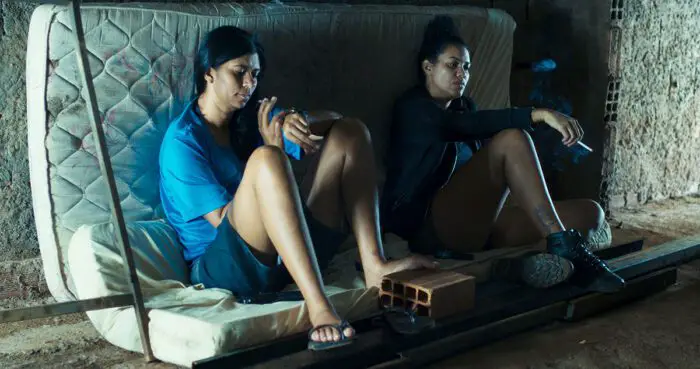“Brother, you can let that son of a bitch know we don’t give a f*ck about no prison messages.” That those are the first words spoken (translated in English subtitles from Portuguese) by the fearsome outlaw Chitara, the protagonist of Dry Ground Burning (Mato Seco em Chamas), should give a sense of the kind of film it is and the kind of woman she is: blunt, uncompromising, and fiery. For a good three-quarters of its two-and-a-half-hour runtime, Dry Ground Burning mines this terrain with a plot that sets Chitara in action leading a revolution against Brazil’s oppressive government. It’s in itself a wild, fascinating, explosive tale, but it’s not all this experimental hybrid collaboration has in store. There’s plenty more fuel in its tank.
Like Dry Ground Burning, a number of recent international releases have explored the boundaries between truth and fiction in genre-fluid experiments. Portugal’s Tommy Guns careens between arthouse drama, guerrilla warfare, and zombie flick. Mexico’s Sansón and Me crosses the border to collapse the boundaries between drama and documentary. France’s The Worst Ones complicates its tale of wayward youth with a clever metatextual flex. From the same country, Full Time heats up a woman’s drama with the tropes and style of the espionage thriller, while the French-Tahitian Pacifiction takes a thriller plot and slows it down to a languid, immersive arthouse pic. None of these have anything on Dry Ground Burning, which takes a surprising turn midway through.
Dry Ground Burning follows Chitara and her all-female gang in Sol Nascente, Brazil, as they siphon and steal precious oil from the authoritarian, militarized Bolsonaro regime. Chitara’s sister Léa is released from prison and brought into her criminal enterprise as a loyal lieutenant. The collective become gasolineiras—petrol pirates, in a sense, who take control of the network of underground crude oil pipelines and, like drug traffickers, manufacture its refining as gasoline, then sell it to the local motorbike riders, who pay a percentage for the privilege. It’s a successful venture for the two sisters, who look to translate their power into politics.

As crime kingpins, the two take on a grassroots political charge, leading a feminist workers’ revolution. Blasting rap from their commandeered bus, partying hearty all the way, the favelas’ motorbikes all in a swirling, ebbing collectivist tow behind them, the Chitara-led gasolineras become a newly-formed, political force: “The People’s Party,” they call themselves, an abolitionist uprising against the Bolsonaro-backed political candidate up for re-election. Anti-authoritarian, feminist, queer, loud, and brash, the gasolineras look like they might have a revolution on their hands, one with the relationship between sisters Léa and Chitara forming the tight bond at its core.
Yet director-writers Joana Pimenta and Adirley Queirós drop a few hints along the way that not all is as it seems in this apparent crime-gangster, sci-fi feminist epic. That political party bus, with the gasolineras boozing, bumping, grinding, and rapping out improvised odes to their leader Chitara and her platform? Suddenly it jump cuts to a prison bus, its jumpsuit-clad inmates glumly staring at the floor in sullen silence. What’s happening?
Later, a long and intimate conversation between sisters break down the film’s diegesis with references to them—their portrayers Alves da Silva and Darc Furtado, both nonprofessional actors cast from the favelas, the former herself like her namesake character just released from prison—discussing the making of the film. Then a time, the police take over the narration with a crime report that elaborates, in bleak, objective, non-negotiable detail Léa-the-actor’s crime and subsequent arrest. It’s as if a harsh reality of life in Bolsinaro’s Brazil has stepped in and interrupted the carefully laid fiction film we’ve been watching.

In a way, this meta-move from filmmakers Queirós and Pimenta makes perfect sense. Queirós, a former Brazilian professional footballer who went on to earn a degree in film studies, and Pimenta, a Portuguese filmmaker who teaches at Harvard, first collaborated on Queirós’ 2017 Once There Was Brasilia—a film that followed an intergalactic agent who is assigned on a mission to travel to Earth and assassinate the Brazilian president. Perhaps they had no alternative but to reroute their film in this documentary direction. But whether the change was precipitated by events beyond their control, as the narrative seems to suggest, or whether it was simply an always-planned metatextual turn intended to highlight the stakes of fiction filmmaking that challenges an authoritarian regime, it’s pretty damn brilliant.
All of this takes place even before a fiery, climactic conclusion. Queirós and Pimenta keep on keeping on as the film’s ride-or-die ethos won’t be quelled by a character’s—an actor’s—arrest. Dry Ground Burning continues to blur the lines between what is real and what is “reel” in what might be described as a documentary-fiction hybrid, a gangster/sci-fi epic with pulpy roots and arthouse intellect—and one of the most invigorating and challenging films to take on the fascism and oppression its characters and actors face.
Grasshopper Film presents the North American theatrical release of Dry Ground Burning (Mato Seco em Chamas) by Joana Pimenta & Adirley Queirós, winner of the Grand Prize at Cinéma du Réel and the Cinema Tropical Award for Best Latin American Film of the Year, opening Friday, April 14, 2023 at the Gene Siskel Film Center in Chicago, April 21 in New York City, and followed by a national release. Brazil, 2022, 154 min. In Portuguese with English subtitles.




